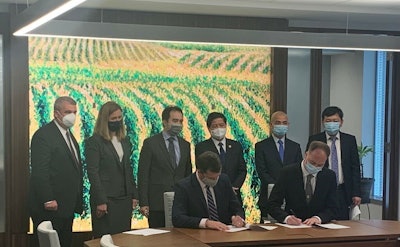
On August 25, Vietnam announced its plan to reduce import tariffs on U.S. corn, wheat and pork products in conjunction with Vice President Kamala Harris’s visit to the country. Vietnam is the seventh-largest agricultural export market for the United States, and this change continues to strengthen ties between the two nations.
Based on the momentum, the U.S. Grains Council (USGC) has been working closely with Vietnamese government and industry leaders to solidify the working relationship between the two groups.
Last week, USGC President and CEO Ryan LeGrand, and Council Senior Director of Global Programs Cary Sifferath, traveled to New York City to witness the signing of two memorandums of understanding (MOUs) between Council members, DeLong Company and Valero, and T&T Group, a Vietnamese feed grain importer. LeGrand was also able to speak with Vietnamese president, Nguyen Xuan Phuc, about tariff reductions on U.S. corn.
“Right now, Vietnam is our number two customer for DDGS behind Mexico, and we want to make sure we can extend and continue to see exports to them,” Sifferath says in a recent interview with the National Association of Farm Broadcasting (NAFB).
“As a very large and growing feed and livestock industry, we work really hard to see DDGS being used there in swine and poultry diets but have even continued to look at ways to break into the aquaculture side of things.”
The day after the signings in New York, Vietnam’s Ministry of Agriculture and Rural Development (MARD) Deputy Minister Le Quoc Doanh, along with several other MARD officials and a representative from Khai Anh Company, a large feed grain importer in Vietnam, visited USGC’s headquarters in Washington, D.C.
USGC signed two MOUs that day with the groups. The MOU between USGC and MARD created an understanding that the two would work together to build Vietnam’s feed, livestock and aquaculture industries.
While meeting with the deputy minister of MARD, LeGrand discussed the importance of reducing the ethanol tariff to allow for more use of clean renewable biofuel as ethanol, while also discussing the tariff reduction on corn. Additionally, the MOU between USGC and Khai Anh Company secures purchasing of U.S. corn and distiller’s dried grains with solubles (DDGS) by the company over the next year.
During the 2019/2020 marketing year, Vietnam was a top buyer of DDGS, purchasing roughly 1.21 million metric tons. Vietnam represented 11.5 percent of all U.S. DDGS purchases in 2019/2020.
MOUs between the U.S. and other countries are important because clear trade priorities and practices are key to efficient trade flows for all parties, but where in the world the next one will occur could prove challenging to predict.
“We're always looking for opportunities to expand exports and U.S. grains in all forms,” Sifferath says. “Signing MOUs again with governments or with industry allows us to sit down and have a mutual agreement going forward on how we can work together so that it's beneficial for both sides.
"The U.S. is excited to be able to export our products around the world, but we need to make sure it's beneficial for that important country as well.”
Listen to Cary Sifferath's interview with the National Association of Farm Broadcasting here.

















